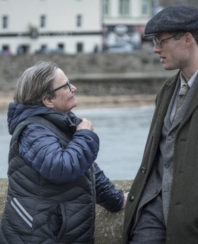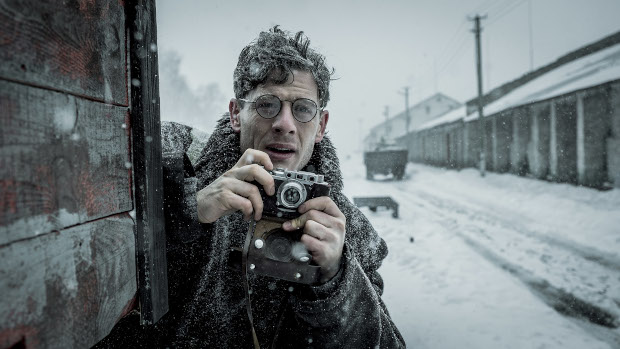
Agnieszka Holland latest is Mr. Jones, a film documenting the efforts of real-life British journalist Gareth Jones to investigate the Holodomor. I got the chance to briefly talk to the director about her film.
Mr. Jones is your first film working with the Holodomor as subject matter, correct?
Yes, I did three movies dealing with the Holocaust, and thought to myself “that’s enough for one lifetime.” But after the script came to me, I felt that it was important subject matter, and so I changed my decision.
So it was the importance that drew you to the subject matter then?
Well, there are several important things which influenced me. The fact that the communist crimes are so unknown and forgotten, and that the Holodomor never really entered the global consciousness, makes the repetition of these kinds of crimes against humanity possible. Another thing is the relevancy I found in the duties and responsibility of journalists in reporting the truth in an objective way without taking sides, and without following somebodies political or ideological agendas. I think this is relevant. The questions Gareth Jones had are relevant in times of strong political polarization where we see media taking sides instead of trying to investigate the facts.
Was the draw more of the journalism aspect, or the Holodomor aspect?
It’s both! What I liked about the script is that those two things are actualized in a very convincing way. The important subject of the Holodomor, and the historical truth that was hidden for a very long time was one thing, but the fact that it was told from the perspective of a journalist that was searching for the truth, and does everything under the risk of his life to report it. The reaction of the political world, the cowardice of the politicians, and the indifference of the public opinions, makes this situation unfortunately relevant.
I’m guessing that this is largely what drew you to creating a film about someone is a bit of an outsider to the conflict.
Correct, Jones is a little bit closer to my point of view. I’m something of an outsider speaking about these facts. For screenwriter Andrea Chalupa, it’s a very personal film, because she is of Ukrainian origins. Her grandfather was a Holodomor survivor. It was always for her very important subject matter. But she is also a political journalist, and is always asking questions about the duties of the media. This perspective is closer to her personal perspective. My parents were also journalist, and so it is also something important to me. But we are living in a time where the media are serving different political agendas. When you watch the news in the United Sates, the facts reported by Fox News are very different from those reported by CNN. It’s similar with social media, and the production of fake news, which is very widespread and dangerous. I felt that it would be refreshing to see the institution of fake news, political propaganda, and alternative truth, are not things invented by the internet. It led to the biggest crimes of the 20th Century. At the same time, the film is an homage to the courage of the journalists who seek the truth.

How much research did you do into Gareth Jones specifically?
Personally, I did a lot of research, but the most of it had been done by the screenwriter, who came to me with a pile of documents, testimonies, and books. I also talked to historians, and when we were shooting in the Ukraine, I talked to survivors who were children when it happened. I have to tell you, for the Ukrainian people it’s extremely emotional subject. Some would be on the verge of tears, or even crying, and it’s been so many years since. The fact that it was dangerous and forbidden to speak about it, made this reality one that was never therapized.
I have a question more generally about your career. You’ve made a number of biographic films, is there something about biographic films that speaks to you?
Frankly, if I have to be sincere, I don’t like biographical films. It winds up being conventional, and pushes you into one direction of filmmaking. It just so happens that I’ve had several interesting characters landed on my plate. When I read the scripts that I hadn’t written (unlike Europa Europa which I wrote myself) I found myself attracted to those that were written like fiction. I also like to take some freedom with the story. I don’t like to be so exact in reporting every chronological detail. I believe that in the really true biographical films, we only know part of the truth about every character. Even if we have their statements, we don’t know what is the hidden, intimate truth. So I like to take some liberties, and to wake up my imagination, and to try and find this inner truth of the character, which is what I try to do when I’m showing fictional characters, rather than simply rely on experts.
There are two kinds of characters that have been interesting to me. One is the geniuses, the people who had special gifts, and then subsequently the question of what do you do with those special gifts. The last movie I did after Mr. Jones,Charlatan, is about an incredibly talented healer. The other kind are the characters who have the gene of courage and justice. To me, being good, courage, and sacrificing yourself to help others and fight for the truth is the real mystery. I don’t know where it is coming from. I know pretty well where the evil is coming from, but this goodness, I don’t know.
Has anything changed between the initial release from a year ago at Berlin?
The original version was about twenty minutes longer. We did some trims right after Berlin. The fat was taken out. But in terms of the storytelling, the story doesn’t change. Only one part was completely unchanged and that was the journey to Ukraine.
I want to very briefly ask you about television. I know that you worked on a number of television programs. What is the chief difference between television and film?
Television is quick, and as a director, my impact is less full. It is an interesting refreshment.
What is next for you?
Charlatan is supposed to be my next film, and we’re waiting for release. It was also shown in Berlinale this year. Now I am preparing a new series for Apple shot in Paris. They’re still trying to figure out if it’s possible in the circumstances.

